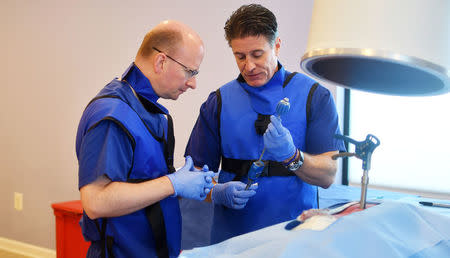Body donations: Frequently asked questions

By John Shiffman and Brian Grow
WASHINGTON (Reuters) -
Q: What is whole-body donation?
A: Most people are buried or cremated when they die. But some bodies are donated “to science,” usually for medical research or education. In most cases, whole-body donations must be authorized by the donor prior to death or, after death, by relatives.
Q: Where do donated bodies go?
A: In most states, there are three choices: donate to a university, to a state agency or to a non-transplant tissue bank, which includes brokers who sell the bodies. The brokers make money by providing bodies and dissected parts to companies and institutions that use them for training, education and research.
Q: Why would a donor choose a body broker over a university or the state?
A: One reason is cost. Brokers often offer donors to pick up the body and transport and cremate it for free in return for body donation. That saves relatives several hundred dollars. Another reason is marketing. Brokers advertise online and work with funeral homes, hospitals, nursing homes and hospices to solicit bodies from the dying and their families. Most university and state-run anatomy programs do not solicit aggressively, and many will not accept bodies of donors who were obese or suffering from certain diseases.
Q: Is whole body donation the same thing as organ donation?
A: No. There’s a big difference. Organ donation involves the transplant of hearts, livers and other vital organs to save or improve the life of another human being. With whole body donation, body parts are not transplanted into other humans, but instead used to study diseases, develop new medical devices and train surgeons.
Q. Why does this distinction matter?
A: Because body brokers receive far less oversight. Although organ transplants are strictly monitored, Reuters found that only 10 states regulate body brokers, and only a handful of those closely inspect them.
Q: What is the Uniform Anatomical Gift Act, or UAGA? Doesn’t it regulate body brokers?
A: Not really. The UAGA is a model law principally focused on who can donate a body or an organ for transplant purposes, and which organizations can receive these gifts. This could include body brokers. It was written by a commission and then adopted by state legislatures - sometimes with amendments specific to the state. Although some brokers and health officials often cite the UAGA as an oversight tool, this can be misleading. Most state anatomical gift laws largely regulate just one side of the process - how a body may be donated. Most do not address what happens next, such as how brokers dissect, handle and ship the parts; the prices they set on human remains; whom they sell them to; how the parts are used by buyers; and the rights of donors and kin.
Q: So it’s legal to sell whole bodies and their parts, even heads and limbs?
A: It's illegal to sell human fetuses. Otherwise, yes: In almost every state, it’s legal to sell the human remains of adults. One misconception promoted by some brokers is that it is illegal to sell body parts and that people who distribute them may only be reimbursed for processing, shipping and other expenses. In most states, such laws only apply to transplant organs, such as hearts and kidneys, and to tissue, such as skin and bone. But in almost every state, these laws do not apply to whole cadavers or to parts, such as torsos, shoulders and heads. Reuters found that some brokers conflate rules for transplant organs with those for non-transplant body parts in order to create the impression that they do not profit from body donations.
Q: Can a broker rent the same body or body part repeatedly to different customers?
A: Yes. For example, a torso might be rented to one medical group for training, returned, and then rented again to another set of doctors.
Q: Is it legal to sell your own body to science?
A: Legal experts disagree. Some lawyers contend that it is not possible. That’s because a person’s property rights to his or her body cease at death. But others note that a person who donates a body to science may receive a free cremation in return, which could be construed as a form of payment. What’s not disputed: Federal law clearly prohibits the sale of one’s own organs and tissue for transplantation.
Q. Can a donor designate their body for research on a specific disease?
A: Yes, but most brokers won’t guarantee they’ll grant the wish. They say it’s too difficult to match inventory with research needs.
(Reported by John Shiffman and Brian Grow; Edited by Blake Morrison)

